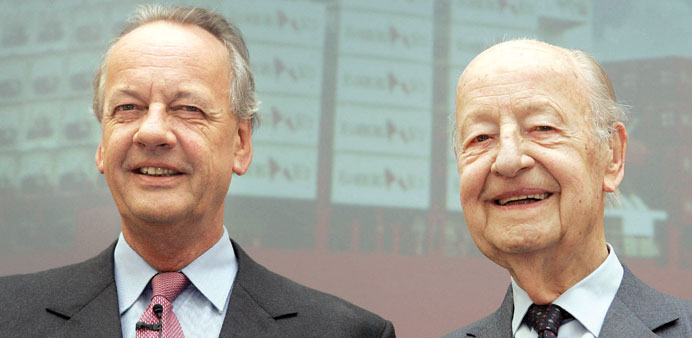Current chief executive August Oetker (left) and his late father, Rudolf-August Oetker.
By Matthias Benirschke
Many big German companies have admitted to once supporting dictator Adolf Hitler, but the story of how a household brand — Dr Oetker of pizza and pudding fame — collaborated with the Nazi regime was for many years a blank. Until now that is.
The company, now one of the world’s largest producers of frozen pizzas, was founded on baking-powder recipes in Bielefeld in 1891 by Dr August Oetker.
For 70 years since the end of World War II, it has remained tight lipped about where the Oetker family stood during the period from 1933, when Hitler became chancellor, through to the end of World War II in 1945.
Pudding patriarch Rudolf-August Oetker (1916-2007) sought to hush up the period and it was left to his 69-year-old son August to open up the company archives and come to a damning conclusion.
“My father was a National Socialist,” the current head of the family pronounced after seeing evidence of his father’s role during the Nazi era.
Oetker is a major manufacturer of convenience foods. When you make an instant pudding or a cake from a powder in many European nations, the chances are that Oetker is involved. Its deep-frozen pizzas are even a best seller in Italy, the home of the cheesy snack, where they are sold under the name brand name Cameo.
The group also has interests in brewing, soft drinks, shipping and banking.
It is one of the few major international brands to include the word “doctor.” This is not because its products are approved by the medical profession, but because the founder was a pharmacist who had a doctor’s degree and he considered the Dr to be an integral part of his name.
The data on the company’s Nazi years has been collected in a new book in German, ‘Dr Oetker and the National Socialists’, written by a team under the guidance of respected Munich history professor Andreas Wirsching.
The authors depict a German society in which many individuals and companies were keen to further their business interests by aligning themselves with Nazis after the extreme right seized power. This was certainly the case with Oetker boss Richard Kaselowsky.
He married Ida, the widow of Rudolf Oetker, who was killed in 1916 while fighting in World War I.
Kaselowsky ran the company and acted as mentor to his stepson Rudolf-August. The couple died in an Allied air raid on Bielefeld in 1944.
Kaselowsky had joined the National Socialist Party in May 1933. He often went to Berlin to meet an elite circle of friends associated with the chief of the German police, Heinrich Himmler. Many leading industrial figures were part of the circle.
The Oetker manager donated large sums of money to Himmler’s cause and in 1937 the Nazis rewarded his generosity by inviting Kaselowsky to a reception at the chancellor’s residence, where he met Adolf Hitler. He later spoke of how the encounter thrilled him.
Kaselowsky was not inspired by the “anti-Semitic racist ideals” of the regime, the study concluded, yet he was “able to seamlessly incorporate the anti-Jewish government policy into his view of the world.”
At the same time “his support for the NSDAP went well beyond ‘simple opportunism’.”
Rudolf-August Oetker had been active in the company since 1941. Following the death of his stepfather and mother, he took charge of running the Oetker Group. He was just 28 years old.
Until then Rudolf-August Oetker had had little contact with the country’s most powerful fascists. Kaselowsky handled those links.
The young mogul was aware of the concentration camps, but naively assumed these were used “to provide protective custody for criminals, homosexuals, gypsies, Jehovah’s Witnesses and Freemasons,” he maintained decades afterwards.
Rudolf-August Oetker had been inducted into the NSDAP (Nazi) Party in 1940 and in July 1941 he volunteered for the notorious Waffen SS, the elite separate army run directly by the Nazi Party.
The pudding manager advanced to the SS officer’s post equivalent to second lieutenant. After the war he claimed he was “ordered” to join the Waffen SS and that the SS rank accorded him was a vanity title of no military significance.
The latest research explodes such myths. Oetker must have actively sought to join the Waffen SS, say the historians.
Wirsching believes the findings do not let Oetker off the hook for the part he played, yet show he was not deeply immersed in Nazi wrongdoing. Like many other companies, the Oetker empire profited from the millions of labourers captured and enslaved by the German army during its numerous campaigns. In 2000, Oetker offered to pay compensation to former slave workers.
Kaselowsky was a typical example of how previously upright citizens fell under the spell of the Nazis. “He was first and foremost an entrepreneur. When he saw the opportunity of combining economic interests with the Nazi ideology, he opted to become a National Socialist.” — DPA

